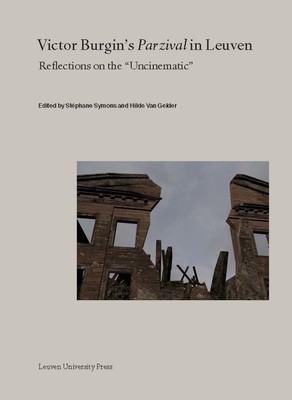
- We will send in 10–14 business days.
- Publisher: Leuven University Press
- ISBN-10: 9462700990
- ISBN-13: 9789462700994
- Format: 17.2 x 22.6 x 1.2 cm, softcover
- Language: English
- SAVE -10% with code: EXTRA
Victor Burgin's Parzival in Leuven (e-book) (used book) | bookbook.eu
Reviews
Description
In commemoration of the destruction of the University Library of Leuven (Belgium) in August 1914, the projection work Parzival, created by Victor Burgin (UK, 1941) in 2013, was installed within the rebuilt Library. The installation uniquely marked the 100th anniversary of the beginning of World War I, which left its profound traces on both the consciousness and physiognomy of the city of Leuven. Burgin's reflection on Richard Wagner's opera Parsifal (premiere 1882) combines the artist's computer modelled images (a bombed out street, a sunset meadow, a Venetian palazzo, ) with citations from Roberto Rossellini's Germany Year Zero (1948) and references to works by Milan Kundera, W.G. Sebald and Philip K. Dick.
This publication provides an in-depth analysis of Parzival, a work that is inspired by the period of seven months that Wagner spent in Venice (1858-1859). Burgin's Parzival raises questions about some of the most fundamental elements in Wagner's operatic work: the longing for a savior, the complex connection between violence and catharsis, and the presentiment that destruction awaits humanity in the future (Götterdämmerung). In an associative manner, Parzival brings together various artistic and political features to confront the romantic ideal of the ruin with the horrors that might result from such a myth.
In addition, this book contains a reprint of Michel Foucault's essay "The Imagination of the Nineteenth Century" (1980).
Contributors
Geert Bouckaert (KU Leuven), Victor Burgin (University of California, University of London, University of Southampton), Alexander Streitberger (Universite catholique de Louvain), Stephane Symons (KU Leuven), Hilde Van Gelder (KU Leuven)
EXTRA 10 % discount with code: EXTRA
The promotion ends in 20d.04:18:30
The discount code is valid when purchasing from 10 €. Discounts do not stack.
- Publisher: Leuven University Press
- ISBN-10: 9462700990
- ISBN-13: 9789462700994
- Format: 17.2 x 22.6 x 1.2 cm, softcover
- Language: English English
In commemoration of the destruction of the University Library of Leuven (Belgium) in August 1914, the projection work Parzival, created by Victor Burgin (UK, 1941) in 2013, was installed within the rebuilt Library. The installation uniquely marked the 100th anniversary of the beginning of World War I, which left its profound traces on both the consciousness and physiognomy of the city of Leuven. Burgin's reflection on Richard Wagner's opera Parsifal (premiere 1882) combines the artist's computer modelled images (a bombed out street, a sunset meadow, a Venetian palazzo, ) with citations from Roberto Rossellini's Germany Year Zero (1948) and references to works by Milan Kundera, W.G. Sebald and Philip K. Dick.
This publication provides an in-depth analysis of Parzival, a work that is inspired by the period of seven months that Wagner spent in Venice (1858-1859). Burgin's Parzival raises questions about some of the most fundamental elements in Wagner's operatic work: the longing for a savior, the complex connection between violence and catharsis, and the presentiment that destruction awaits humanity in the future (Götterdämmerung). In an associative manner, Parzival brings together various artistic and political features to confront the romantic ideal of the ruin with the horrors that might result from such a myth.
In addition, this book contains a reprint of Michel Foucault's essay "The Imagination of the Nineteenth Century" (1980).
Contributors
Geert Bouckaert (KU Leuven), Victor Burgin (University of California, University of London, University of Southampton), Alexander Streitberger (Universite catholique de Louvain), Stephane Symons (KU Leuven), Hilde Van Gelder (KU Leuven)


Reviews